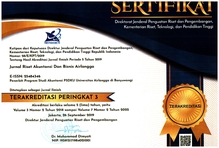INSTITUTIONAL OWNERSHIP AND TAX AVOIDANCE: COMPARATIVE STUDY IN BUMN (BADAN USAHA MILIK NEGARA) AND PRIVATE COMPANIES
Comparative Study in BUMN (State-Owned) and Private Companies
Downloads
This study aims to provide empirical evidence regarding the effect of institutional ownership on tax avoidance and differences in tax avoidance in state-owned and private companies. This study uses a quantitative approach with explanatory and comparative methods. The sample of this research is state-owned and private companies listed on the Indonesia Stock Exchange from 2014 to 2018 with a total of 60 companies. The sampling technique in this study uses a purposive sampling method. Hypothesis testing in this study uses Multiple Regression Linear Analysis to examine the effect of institutional ownership on tax avoidance and uses the Independent Sample T-Test to examine differences in tax avoidance in BUMN and private. The results of this study indicate that institutional ownership has no effect on the practice of corporate tax avoidance. This study also finds that there is no significant difference in tax avoidance practices in state-owned and private companies. The results of this study are expected to be suggestions for shareholders, especially institutional ownership to improve their monitoring function to the management to minimize tax avoidance. In addition, the government is expected to provide supervision with the same proportions, both to BUMN and private companies.
Downloads
Arianandini, Putu Winning, dan I Wayan Ramantha. (2018). Pengaruh Profitabilitas, Leverage, dan Kepemilikan Institusional pada Tax Avoidance. E-Jurnal Akuntansi, 22(3), 2088-2116.
Ariawan, I Made A. R., dan Putu Ery Setyawan. (2017). Pengaruh Dewan Komisaris Independen, Kepemilikan Institusional, Profitabilitas dan Leverage terhadap Tax Avoidance. E-Jurnal Akuntansi, 18(3), 1831-1859
Asyikin, Jumirin, dan Veronica Suryanti Tanu. (2016). Analisis perbandingan kinerja keuangan antara perusahaan farmasi milik pemerintah (BUMN) dengan perusahaan farmasi swasta yang terdaftar di Bursa Efek Indonesia. Jurnal Ilmiah Bisnis dan Keuangan, 1(1).
Bhojraj, Sanjeev, dan Partha Sengupta. (2003). Effect of corporate governance on bond ratings and yields: The role of institutional investors and outside directors. The journal of Business, 76(3), 455-475.
Chan, K Hung, Phyllis LL Mo, dan Amy Y Zhou. (2013). Government ownership, corporate governance and tax aggressiveness: evidence from China. Accounting & Finance, 53(4), 1029-1051.
Chen, Shuping, Ying Huang, Ningzhong Li, dan Terry Shevlin. (2019). How does quasi-indexer ownership affect corporate tax planning? Journal of Accounting and Economics, 67(2-3), 278-296.
Diantari, Putu Rista, dan IGK Agung Ulupui. (2016). Pengaruh Komite Audit, Proporsi Komisaris Independen, dan Proporsi Kepemilikan Institusional terhadap Tax Avoidance. E-Jurnal Akuntansi, 16(1), 702-732.
Elyasiani, Elyas, dan Jingyi Jia. (2010). Distribution of institutional ownership and corporate firm performance. Journal of banking & finance, 34(3), 606-620.
Fadhilah, Rahmi. (2014). Pengaruh good corporate governance terhadap tax avoidance (studi empiris pada perusahaan manufaktur yang terdaftar di bei 2009-2011). Jurnal Akuntansi, 2(1).
Fen, Shie, dan Ernie Riswandari. (2019). Effect of Executive Compensation, Representatives of Female CFO, Institutional Ownership And Company Sizes on Tax Agressivity Measures. EAJ (Economics And Accounting Journal), 2(2), 104-123.
Gaaya, S., N. Lakhal, dan F. Lakhal. (2017). Does Family Ownership Reduce Corporate Tax Avoidance? The Moderating Effect of Audit Quality. Managerial Auditing Journal, 32, 731-744.
Ghozali, Imam. (2011). Aplikasi Analisis Multivariate Dengan Program SPSS. Semarang: Badan Penerbit Universitas Diponegoro.
Hanlon, Michelle, dan Shane Heitzman. (2010). A review of tax research. Journal of Accounting and Economics, 50(40), 127-178.
Idzni, Irsalina Nur, dan Agus Purwanto. (2017). Pengaruh Ketertarikan Investor Asing dan Kepemilikan Institusional terhadap Penghindaran Pajak Perusahaan. Diponegoro Journal of Accounting, 6(1), 1-12.
Ilyas, Wirawan B., dan Diaz Priantara. (2016). Manajemen & Perencanaan Pajak Berbasis Risiko. Jakarta: IN MEDIA.
Jensen, M., dan W Meckling. (1976). Theory of The Firm: Managerial Behaviour, Agency Cost and Capital Structure Journal of Finance Economics (Vol. 3, pp. 305-360).
Khan, Mozaffar, Suraj Srinivasan, dan Liang Tan. (2017). Institutional ownership and corporate tax avoidance: New evidence. The Accounting Review, 92(2), 101-122.
Khurana, I., dan W. Moser. (2013). Institutional Shareholders' Investment Horizon and Tax Avoidance. The Journal of the American Taxation Association, 35(1), 111-134.
Krisna, Adisti Maharani. (2019). Pengaruh Kepemilikan Institusional dan Kepemilikan Manajerial pada Tax Avoidance dengan Kualitas Audit Sebagai Variabel Pemoderasi. Wacana Ekonomi (Jurnal Ekonomi, Bisnis, dan Akuntansi), 18(2), 82-91.
Lanis, Roman, dan Grant Richardson. (2013). Corporate social responsibility and tax aggressiveness: a test of legitimacy theory. Accounting, Auditing & Accountability Journal.
Mardiyani. (2017). Analisis Perbandingan Kinerja Keuangan Perusahaan Farmasi Milik BUMN dan Swasta. Jurnal Inspriasi Bisnis & Manajemen, 1(1), 19-30.
Ngadiman, dan Christiany Puspitasari. (2014). Pengaruh Leverage, Kepemilikan Institusional, dan Ukuran Perusahaan terhadap Penghindaran Pajak (Tax Avoidance). Jurnal Akuntansi, 18(03).
Owusu-Ansah, Stephen. (2000). Timeliness of corporate financial reporting in emerging capital markets: Empirical evidence from the Zimbabwe Stock Exchange. Accounting and business research, 30(3), 241-254. owusu
Peranginangin, Elis Melina, Darwin Lie, Jubi Jubi, dan Ady Inrawan. (2017). Pengaruh agresivitas pajak dengan return on asset (ROA) sebagai variabel kontrol terhadap corporate social responsibility (CSR) pada perusahaan subsektor farmasi yang terdaftar di Bursa Efek Indonesia. Financial: Jurnal Akuntansi, 3(2), 19-27.
Pohan, Chairil Anwar. (2013). Manajemen Perpajakan: Strategi Perencanaan Pajak dan Bisnis. Jakarta: PT Gramedia Pustaka Utama.
Prakosa, Kesit Bambang. (2014). Pengaruh Profitabilitas, Kepemilikan Keluarga, dan Corporate Governance terhadap Penghindaran Pajak di Indonesia. Simposium Nasional Akuntansi XVII.
Rahayu, Siti Kurnia. (2010). Perpajakan Indonesia: Konsep dan Aspek Formal. Yogyakarta: Graha Ilmu.
Republik Indonesia. Peraturan BAPEPAM VIII G.7 Tahun 2012 tentang Penyajian dan Pengungkapan Keuangan Emiten. (2012). Indonesia.
Republik Indonesia. Undang-Undang Nomor 19 Tahun 2003 tentang Badan Usaha Milik Negara. (2003). Indonesia.
Richardson, Grant, Bei Wang, dan Xinmin Zhang. (2016). Ownership structure and corporate tax avoidance: Evidence from publicly listed private firms in China. Journal of Contemporary Accounting & Economics, 12(2), 141-158.
Suandy, Erly. (2017). Perencanaan Pajak Edisi 6. Jakarta: Salemba Empat.
Sugiyono. (2011). Metode Penelitian Pendidikan. Bandung: Alfabeta.
Suprimarini, Ni Putu Deiya, dan Bambang Suprasto. (2017). Pengaruh Corporate Social Responsibility, Kualitas Audit, dan Kepemilikan Institusional pada Agresivitas Pajak. E-Jurnal Akuntansi, 19(2), 1349-1377.
Wijayanti, Yoanis Carrica, dan Ni Ketut Lely A. Merkusiwati. (2017). Pengaruh Proporsi Komisaris Independen, Kepemilikan Institusional, Leverage, dan Ukuran Perusahaan pada Penghindaran Pajak. E-Jurnal Akuntansi, 20(1), 699-728.
Copyright (c) 2021 Jurnal Riset Akuntansi Dan Bisnis Airlangga

This work is licensed under a Creative Commons Attribution-NonCommercial-ShareAlike 4.0 International License.

























